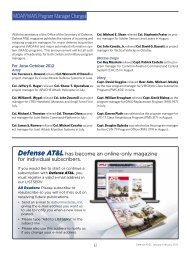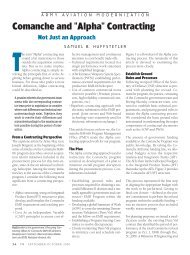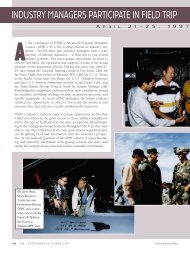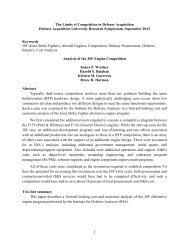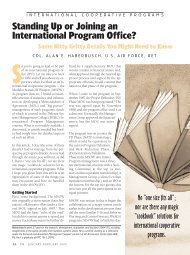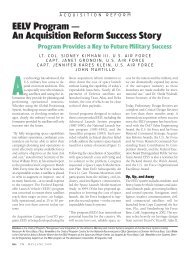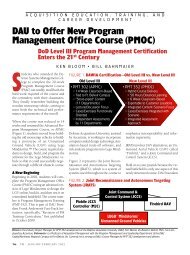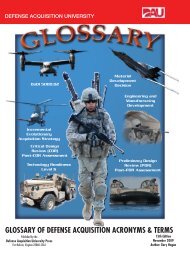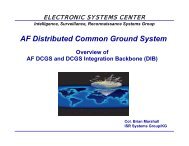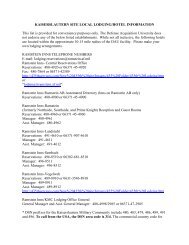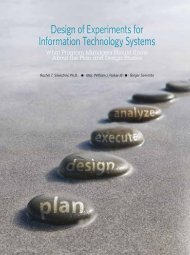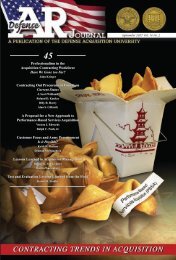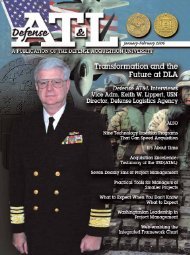Defense ARJ - Defense Acquisition University
Defense ARJ - Defense Acquisition University
Defense ARJ - Defense Acquisition University
Create successful ePaper yourself
Turn your PDF publications into a flip-book with our unique Google optimized e-Paper software.
<strong>Defense</strong> <strong>Acquisition</strong> Review Journal<br />
However, the efficacy of the strategic planning paradigm as a method for allocating<br />
resources (e.g., Gulick, 1937; Ansoff, 1979; Bryson, 1995; Kaplan & Norton, 1996;<br />
Lewis, Brown, & Schrader, 1999) has been under considerable attack for decades<br />
(e.g., Lindblom, 1959; Allison, 1969; Mosher, 1969, Rittel & Webber, 1973; Steinbruner,<br />
1974; Senge, 1990; Mintzberg, 1994; Kingdon, 1995; Michael, 1997; Stone,<br />
1997; Downs, Durant & Carr, 2003). This article addresses this dichotomy by presenting<br />
the case for higher order sensemaking—shorthand for the phenomenological<br />
view 1 of how human beings can purposefully use, modify, reject, create, and share<br />
paradigms when dealing with complex or chaotic situations.<br />
This is an argument for sensemaking, centering the discussion on transforming<br />
how to think about managing DoD resources. It highlights the limits of technical<br />
rationality (the philosophical basis of PPBE), the logic of political reasoning, and the<br />
complexities of the contemporary operating environment (COE). The phenomenological<br />
proposition is that by presenting thoughts about collaborative inquiry from a<br />
social constructionist perspective, DoD professionals (both civil servants and military<br />
officers) and their clients (political appointees or elected officials) can make better<br />
shared sense of managing resources under complex and chaotic conditions. 2<br />
152<br />
senseMakinG WitHin tHe PPBe context<br />
The modern concept of rationality is a relatively new one in the scheme of world<br />
history. René Descartes (1596–1650) was an important framer of the enlightenment<br />
associated with the idea that the world can be objectified through the emerging positivist<br />
philosophy of Newtonian science. 3 The central idea of scientific (or technical)<br />
rationality is that objectivity can be verified with the content of a positivistic body of<br />
knowledge (Hacking, 1982). Recently, post-Newtonian scientists (i.e. postpositivists)<br />
have challenged the Cartesian assumptions associated with the belief in objective<br />
reality—that the world is separate from us and our conceptualizations of it (e.g.,<br />
Weick, 1995; Hatch, 1997; Kilduff & Mehra, 1997; Whipp, 1999). The common<br />
sense (prevalent social-psychological disposition) associated with René Descartes’<br />
I think therefore I am, is replaced with the less common sensemaking premise of, I<br />
think therefore I imagine.<br />
Sensemaking, a form of imagination, is characterized by individuals and groups<br />
using, modifying, rejecting, and creating new paradigms or mental models when<br />
dealing with situations of incoherency and disorderliness (Weick, 1995). Sensibility<br />
is about reaching a condition of open receptiveness to emergent and sometimes<br />
counterintuitive and countercultural mindfulness as contrasted with a taken-forgranted<br />
mindlessness. The idea of mindfulness is oriented on being wholly engaged<br />
in scrutiny, a continuous refinement of expectations based on new experiences, and<br />
a willingness to invent new expectations (Weick, 1998). For example, the positivistbased<br />
assumptions of strategic planning include a belief that predicting pathways to<br />
achieving goals will bring certain finality to solving problems. Incommensurate with<br />
that logic, sensemaking implies there is no finality because humans socially construct<br />
a reality that they can never be certain about (Berger & Luckmann, 1967; Searle,



